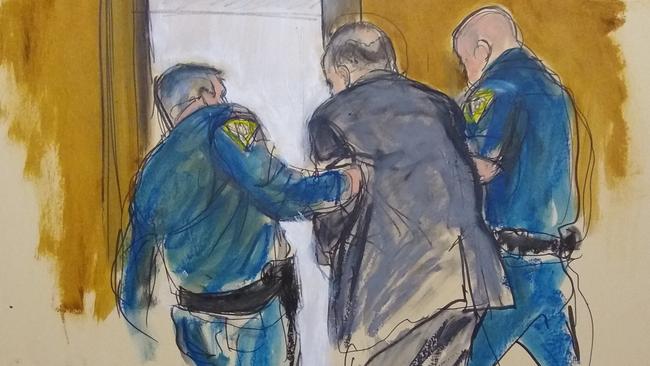Harvey Weinstein verdict an encouraging step for victims
The jury decision to convict Havvey Weinstein will embolden prosecutors and victims, experts say.

Harvey Weinstein’s conviction on sex-crime charges stands to encourage victims to come forward and bolster prosecutors considering similar cases, legal experts say, even though the jury acquitted the Hollywood producer on three out of five criminal counts.
Convicting Weinstein of only the two lesser charges — a first-degree criminal sex act and third-degree rape — may seem like only a partial win for Manhattan prosecutors. But legal experts said the verdict could have far-reaching consequences. It shows that juries in the #MeToo era would believe a sex crime can occur within an ongoing relationship, even without corroborating physical evidence.
It also raises the likelihood that accusers will trust law enforcement and co-operate, which is essential to successful prosecutions, experts said.
“This verdict will embolden other prosecutors to take cases to trial where the overwhelming proof will rely on the credibility of the victims,” said New York University School of Law professor Stephen Gillers. “Juries today are unlike juries in the past, and willing to believe women even in the face of effective challenges to their credibility.”
Weinstein’s prosecution relied almost entirely on the testimony of his accusers, some of it undercut by defence witnesses or their own emails and text messages. Prosecutors didn’t call any police officers after a lengthy investigation in which prosecutors said there were law-enforcement missteps.
It comes nearly two years after a Pennsylvania jury convicted entertainer Bill Cosby after a second trial, viewed as a milestone in the #MeToo movement. The judge in that trial, as in Weinstein’s, allowed the testimony of accusers who weren’t part of the charges.
Weinstein’s first-degree criminal sex act conviction stemmed from an accusation that he forced oral sex on production assistant Miriam Haley in 2006. The rape count stemmed from accusations by Jessica Mann, a former aspiring actress, that Weinstein raped her in 2013.
Defence lawyers said both women had a choice, could have stopped Weinstein and later continued consensual relationships with him. He has denied all accusations of non-consensual sex and his lawyer has said he would appeal. Both women testified that they felt trapped and couldn’t repel him.
In acquitting the 67-year-old of first-degree rape with Ms Mann, but convicting of third-degree rape, the jury found he had sex with her against her will but didn’t see enough proof that he used physical force or threats of harm.
“Her testimony is she had no way out, and the spectre wasn’t out of physical fear,” said Barbara Barron, a professor at Hofstra University School of Law, of Ms Mann. “With this conviction, it’s an illustration of how and why it could happen, and that’s a landmark step.”
The verdict will likely encourage accusers to speak with prosecutors who are considering bringing sex-crime cases, and make them more likely to trust a system that requires proof beyond a reasonable doubt, experts said.
“There is always a deep-seated fear of not being believed when a survivor comes forward to tell his or her story,” said Lisa Linsky, a former sex-crime prosecutor.
Still, the jury acquitted Weinstein on two counts of predatory sexual assault, a felony that includes committing sex crimes against more than one person. That charge carried a maximum sentence of life in prison.
To find Weinstein guilty of predatory sexual assault, the jury would have had to believe the account of Sopranos actress Annabella Sciorra, who testified that Weinstein raped her in the early 1990s inside her Manhattan apartment.
Professor Barron said acquittals shouldn’t discourage prosecutors from bringing similar future charges in other cases. The not-guilty verdicts serve as a reminder of the challenges of older allegations that aren’t supported by forensic evidence, she said.
The acquittal on the predatory sexual assault charges also highlights the importance of educating the public about physical evidence, particularly given the seriousness of those charges, said Heidi Reavis, a legal partner who works on sexual-harassment cases.
“The fact that Sciorra’s testimony was in effect disregarded may ultimately mean that law-enforcement offices step up their communications to the public about the vital importance of capturing forensic evidence right away,” she said.
The Wall Street Journal



To join the conversation, please log in. Don't have an account? Register
Join the conversation, you are commenting as Logout